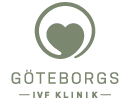Egg donation – IVF with donated eggs
Göteborgs IVF Klinik has, since opening at the turn of 2019/2020, been licensed to perform IVF using both donated eggs and donated sperm.
We collaborate with egg banks in Europe that operate under legislation equivalent to Sweden’s requirement for open-identity donors—meaning the child has the right, at mature age, to obtain information about their genetic origin if they wish. By working with egg banks, we can shorten waiting times for eggs. The banks have extensive experience and strong results—just like us at Göteborgs IVF Klinik, where both our doctors and embryologists have long worked with donation.
If your partner is a man and has a normal semen analysis according to WHO criteria, and in cases of double donation, we offer a blastocyst guarantee—ensuring at least one blastocyst for transfer.
When is egg donation appropriate?
For example, if your assessment indicates that the chance of pregnancy with your own eggs is extremely low and egg donation has been recommended, or if you have undergone IVF attempts that have not succeeded.
Recipient assessment
All recipients of donated gametes undergo an assessment that includes both a medical and a psychosocial evaluation—a special review. You may already have completed the medical assessment with another gynecologist at another clinic, or it may be done before your egg-donation consultation here by our experienced subspecialists in Reproductive Medicine.
If your assessment was performed elsewhere, it is very helpful if you bring all previous medical records and test results to your first visit with us. Older examinations and tests will be updated, and if anything was missed previously it will be completed. We will also perform a new gynecological examination with transvaginal ultrasound. If it has been more than six months since your uterine cavity was assessed (HSS/cavity assessment), this needs to be scheduled to rule out polyps or anything else that could interfere within the uterine cavity.
Initial consultation
At the first visit, you will receive information about the entire process.
According to Swedish recommendations, a donor may not contribute to children in more than six families in Sweden. There are, however, no rules limiting the total number of families worldwide. In egg donation this tends to be self-limiting, since an egg donor can usually donate only a limited number of times.
Donor eligibility review / special assessment
Under Swedish law, a donation assessment must be carried out by a psychologist or specially trained behavioral scientist. Even if such an assessment has been performed previously, it may need to be repeated, especially if time has passed. At your initial visit, our midwife can book an appointment for a donation assessment with our specialist psychologist if you wish. Typically two visits are needed, though sometimes one is enough and, in a few cases, more may be required.
After the psychologist visit(s), a donation conference is held where your donation team—including the treating physician and the psychologist—reviews your case and decides whether donation is possible. This conference usually takes place within two weeks of your last psychologist visit, and our midwives will inform you by phone shortly thereafter.
Planning the treatment and ordering
When the entire assessment, including the special review, is complete, we can proceed with planning. Often, matching eggs can be ordered directly; in some cases it may take longer depending on donor availability. At your initial doctor’s visit you will receive financial information and agreements. These agreements must be signed by you (and partner, if applicable), and the invoice must be paid before we order the eggs.
Treatment
Egg donation can be carried out with either fresh or frozen eggs. Due to updated regulations, egg-donation treatments are now generally performed with frozen eggs. If there is a male partner, he provides his semen sample on the day the frozen eggs are thawed for fertilization. In double donation, both eggs and sperm are thawed the same day. The embryos are then monitored daily, and the blastocyst(s) of good quality that develop will be frozen.
Embryo transfer must be synchronized with the recipient. This is primarily done in a natural cycle if the recipient has one. If you no longer have menstrual cycles, the transfer is performed in a hormone-prepared cycle. We will explain this in more detail at your first doctor’s visit. Around the time of ordering the eggs, the clinic’s midwife will review your treatment protocol with you.
Recipient requirements regarding age and health
Embryo transfer (fresh or frozen) must take place before the gestational woman turns 45. In addition, the recipient must be healthy, with no medical conditions that would pose increased risk to her or the baby during pregnancy or childbirth. The recipient’s BMI (body mass index) must be ≤ 35 at the time of transfer.
If there are other medical conditions that could affect pregnancy and delivery, we can, when needed, refer you for a preconception consultation with obstetricians at Östra Hospital/Sahlgrenska University Hospital (SU) to evaluate any risks and the suitability of pregnancy. If pregnancy is deemed appropriate, a plan for management and monitoring during pregnancy can be made at the same time.
Outcomes
In egg donation and double donation (donation of both eggs and sperm), donors are young and healthy with good ovarian reserve and good semen quality; often—but not always—they have children of their own. Consequently, outcomes with egg donation are very good: per embryo transfer, the chance of pregnancy is 50–60%, and the live birth rate is 45–55%.
